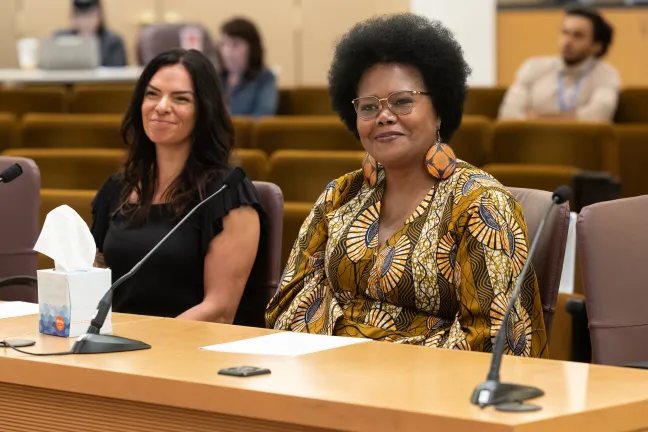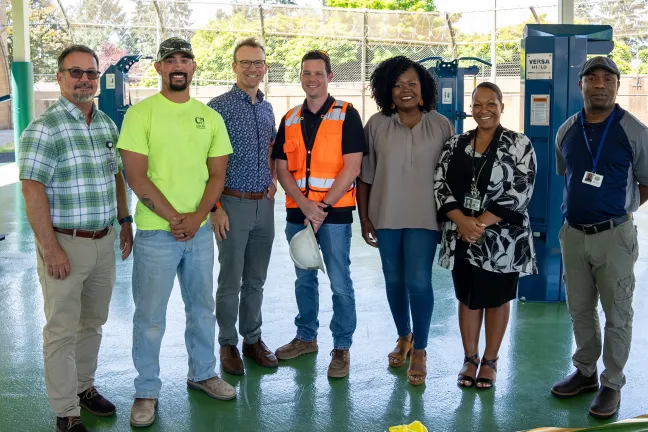The Board of County Commissioners on Thursday, July 20, proclaimed the week of July 16 through July 22 as Pretrial, Probation, and Parole Supervision Week in Multnomah County. The week of recognition celebrates the hard work and dedication of pretrial, probation and parole professionals across the country and Canada in promoting justice and healing.
The Department of Community Justice (DCJ) and its workforce of over 500 employees contribute daily to its vital role of maintaining public safety. DCJ staff include parole and probation officers, juvenile court counselors, juvenile custody services specialists, corrections counselors, administrative staff, employment coordinators, victims advocates, community health specialists, program specialists, nutrition staff and many others who dedicate their lives to this crucial work.
Together, DCJ staff work closely with justice-involved adults and youth to help prevent crime by addressing the underlying issues driving crime, offering support, creating accountability, and encouraging lasting behavior change.
The Department of Community Justice “has the really complex task of making sure that the people that we are working with are going towards paths of restoration,” Chair Jessica Vega Pederson said.
“The work isn’t easy and we have incredible staff that are doing this work.”
This year commemorates the twenty-third annual Pretrial, Probation and Parole Supervision (PPPS) Week, a celebration that first began in 1999 when American Probation and Parole Association members began requesting that states across the country recognize the 100,000+ people involved in community corrections.
Each year, DCJ supervises more than 7,500 adults and 2,200 youth. The department also provides advocacy services to more than 1,800 victims and survivors, and completes more than 1,000 mediations between parents involved in custody disputes. Its Recognizance Unit processes more than 13,000 cases each year.
“The work you do is so important and so difficult,” Commissioner Susheela Jayapal said. “I know you and your teams have persevered through a complicated time and continues to be a complicated time — a lot of calls for change and reform, a lot of pressure on the public safety system.”
Leaders with the Multnomah County Sheriff’s Office, which operates a pretrial program, were also present at Thursday’s proclamation. The Sheriff’s Office operates Close Street which utilizes corrections deputies, a corrections technician and a corrections counselor to provide pretrial monitoring services to defendants who have been assessed as “high risk” by the courts.
The collaboration between the Department of Community Justice and the Sheriff's Office demonstrates the importance of working together, across professional disciplines, in community corrections and highlights this year’s theme “Stronger Together.” Collaboration can take many shapes and forms including sharing best practices, promoting innovative strategies, and building connections with other criminal justice agencies and stakeholders, speakers highlighted.
Department of Community Justice Director Erika Preuitt briefed the Board on the importance of collaboration in advancing the department’s mission. DCJ leaders, she said, are focused on finding ways to work with community-based organizations and public safety agencies, as well as across County departments, to “address violence and harm while helping people engage in positive change.”
“It takes every single person in our department to support our vision of ‘Community Safety through Positive Change,’” Preuitt said.
Department of Community Justice adapts to post-pandemic world
Presenters updated the Board on recent developments across DCJ.
The department’s Juvenile Services Division is continuing work to update its detention center to be more developmentally appropriate and trauma informed. Just recently, the department held a dedication ceremony for a covered outdoor recreation space that will allow youth in detention to participate in outdoor activities all year long.
“Thank you for your continued support of this project,” Preuitt told the Board.
Denise Peña, the deputy director of the Department of Community Justice, provided updates on the Adult Services Division, highlighting a range of new culturally specific investments aimed at better serving justice-involved individuals. As with juvenile services, “the adult side is focused on increased presence as we adjust to the post-pandemic world,” she said.
Peña shared about the Habilitation, Empowerment, Accountability, Therapy (H.E.A.T.) program, a curriculum tailored for African American men involved with the criminal justice system. After a successful pilot, the program is now expanding to women and youth. Eventually, leaders hope to offer programming for Latinx individuals.
The Diane Wade program, an Afrocentric women’s program with culturally responsive services, is also accepting new clients in August after a pause in operations. The expansion is a partnership with Urban League of Portland.
Peña said the department has also seen success with the Stabilization and Readiness Program, which serves the highest-need individuals who are experiencing severe and persistent mental illness.
“We are proud of them for finding solutions to a complex issue,” Peña said.
Preuitt concluded the presentation with a reading of the proclamation. Afterward, Board members commented on the department’s resilience, accountability and innovation and its ability to endure through difficult times.
Commissioner Julia Brim-Edwards, who was sworn in as District 3 Commissioner in June 2023, expressed her appreciation for the services the department provided and said that she’s looking forward to learning more about the work of the department.
“I personally am deeply appreciative of the work that you and your team do to advance justice and healing,” Commissioner Sharon Meieran said, adding that their work is “so important in our community, particularly among those who are historically marginalized, disenfranchised and vulnerable.”


